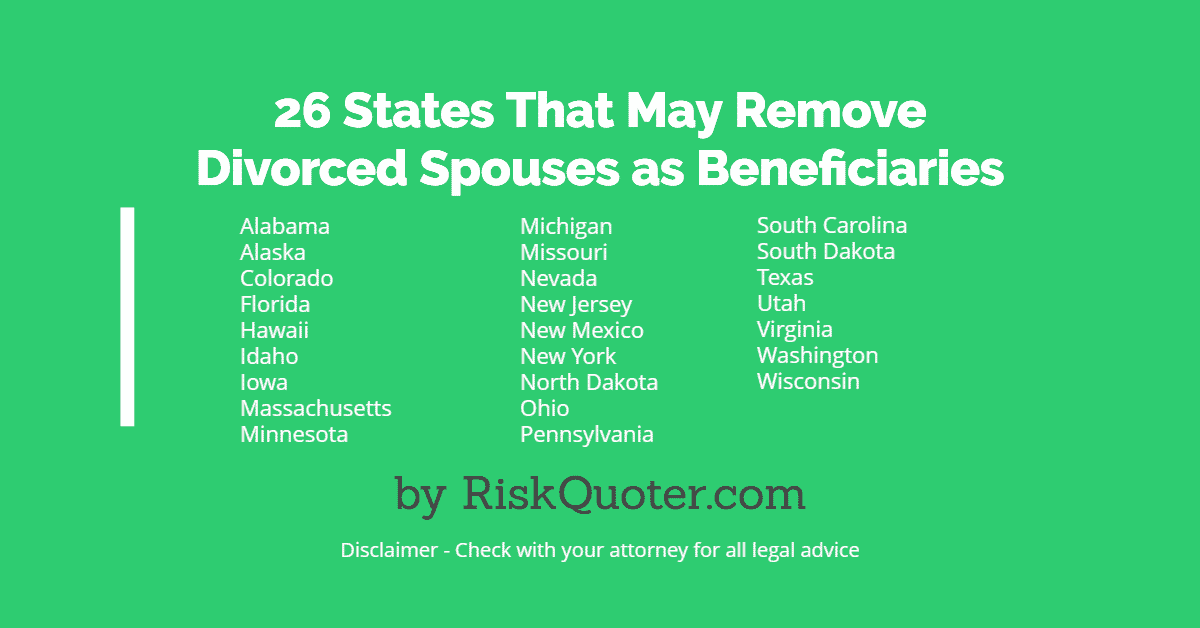Do you need life insurance as part of a divorce decree?
Divorce Overview
Life insurance is a requirement for many divorce agreements.
And whether you have to provide life insurance or you’re the beneficiary receiving life insurance,
This guide – Life Insurance 101 will help you in your decision-making.
While this article helps you better understand life insurance and divorce,
Nothing replaces the legal advice of a good divorce attorney.
Life Insurance Ownership
If you remember nothing else about life insurance ownership, remember that the owner has the life insurance policy rights to make changes.
Why should that matter to you?
Policy Owner Rights
The life insurance policy owner controls the policy and can make any of the following changes.
Beneficiary Changes – The owner can add beneficiaries, remove them, or change the percentage to be received.
Premium Payments – the owner can stop paying the premium on the policy and let it lapse.
Suppose it’s universal life insurance or a whole life policy.
In that case, the owner may pay less than the illustrated premium or convert the term policy, leaving a policy that could lapse.
Accelerated Benefits – Many policies have built-in provisions that allow the policyholder to accelerate a portion of the death benefit.
If the insured is chronically or terminally ill, the accelerated death benefit, if activated, will reduce the amount the beneficiary receives upon death.
Death Benefit Changes – the owner can reduce the face amount of the life insurance policy or discontinue any policy riders, such as accidental death, waiver of premium, etc.
Policy Loans – the owner may take loans against the cash value of a universal or whole life insurance policy.
Any outstanding loan at death reduces the amount paid to beneficiaries.
Collateral Assignment – the owner may assign the life insurance policy as collateral for an SBA loan.
At death, the lender would receive the amount owed to them with the remaining balance paid to the beneficiary.
Absolute Assignment – the owner may permanently transfer ownership of the policy to someone else.
After reading the above, you may want to be the owner of any life insurance policy.
The following are reasons why you want to be the owner.
Divorce Settlement Options
When the insured dies, the beneficiaries will receive the death benefit in a lump sum, or will they?
Did you know the policy owner may control how the beneficiary receives the death benefit?
That’s right.
The owner can set up how beneficiaries receive the death benefit.
For example, you may be entitled to a $5 million life insurance policy, but your ex-spouse could set up the policy to be paid out over an extended period.
And you might not know about it until somebody files a death claim.
You would probably want to know about that upfront.
Knowing that this option exists with many policies is essential whether you are the insured or the beneficiary.
We dedicated an entire article to the settlement options available – here.
Beneficiaries in Divorce
Did you know many states have laws removing the divorced spouse as a life insurance beneficiary?
It’s true.
There are at least 26 states with some form of “re-designation statute” on the books.
This type of statute will automatically remove the ex-spouse as the beneficiary in divorce.

Make sure you discuss this with your attorney.
You don’t want to assume you are automatically still the beneficiary after the divorce.
This leads to another common question.
Can you change the beneficiary during your divorce proceedings?
Many states require that you file an affidavit or certification of insurance coverage as part of the divorce.
Courts may require the parties to maintain all coverage listed on the above affidavit without changes during the divorce.
Divorce Underwriting
How much life insurance does the divorce decree require?
It’s rarely a problem with life insurance underwriting to obtain the amount of life insurance indicated in the divorce,
Unless it’s considered excessive.
Even then, we can meet your needs by working with multiple life insurers.
Paramedical exams may be required depending on the company you apply to.
Generally, life insurance companies charge less for fully underwritten policies than for no-exam life insurance.
Is your ex a tobacco user? We have underwriting programs available that give non-tobacco rates to:
Cigarette smokers have to pay tobacco rates, but incentive programs are available to reduce cigarette rates.
Ex-Spouse Has Medical Issues
Medical issues may complicate divorce life insurance requirements due to the potential cost and ability to obtain coverage.
Life insurance companies may add an extra expense to the policy called a table rating.
Each table rating adds approximately 25% to the price (1-16 tables are available)
A benefit of working with us is we know health impairments,
And how to find the most affordable life insurance based on health issues, whether they are overweight or have significant medical conditions.
Why would you care about the price if your ex has to pay for coverage?
Here’s why.
Some states have laws that give your ex-spouse a free pass from having to get life insurance.
Connecticut, for example, has a law on the books that states:
The court may order that a party obtain life insurance as such security unless such party proves, by a preponderance of the evidence, that such insurance is not available to such party, such party is unable to pay the cost of such insurance or such party is uninsurable.
CT General Statutues Section 46b-82
The insured can show proof that they are uninsurable by providing:
- Declination letters from insurance companies
- A copy of the insured’s MIB record
- A letter from the insurance agent who shopped for coverage.
That’s why you want to get the best rates possible for life insurance.
If there is a family history of heart disease or cancer, we’ll steer you to the best life insurers based on your family history.
Even if the insured has been denied life insurance with another company, they may still be insurable elsewhere.
There is usually a policy available for most people, whether it’s heart disease, cancer, diabetes, marijuana, drug/alcohol history, weight issues, or anything else.
If you can access the insured’s medical records, we can check with companies to see if the insured is uninsurable.
Other options for the truly uninsurable include guaranteed issue life insurance and accidental death insurance.
Divorce Life Insurance Policies
While getting a copy of the life insurance policy is essential, there is something even more important to get.
It’s called a “verification of coverage” request.
While the life insurance policy contains the contractual terms and the original owners and beneficiaries,
It doesn’t reflect the current setup.
Verification of coverage works best by providing you with the current ownership and beneficiary information.
The verification will also tell you if a debt has been assigned to the policy.
If a permanent life insurance policy is part of the divorce, insist on getting two “in-force illustrations.”
- The first request should be to illustrate the policy based on the current premium being paid.
- The second request should ask what premium is needed to have the cash value equal to the face amount of the policy (endow) at age 100.
The in-force illustration shows how the policy is projected to perform based on the premiums the policyholder pays.
Policy Exclusions
If your ex-spouse is a private pilot or scuba dives, life insurance may cost more due to a flat extra.
Some life insurance companies allow you to save money by adding an exclusion rider to the policy.
The downside of exclusion riders is that the policy will not pay the death claim if the insured dies from the excluded activity.
If you’re the life insurance policy beneficiary, ensure no exclusion rider exists.
Term Life Insurance in Divorce
Term life insurance is the most common type of life insurance used in divorce.
It covers most needs and is the most affordable life insurance.
Term life insurance durations range from 10 – 40 years, depending on the company, age, etc.
You can get 500K life insurance – no medical exam required.
Up to $3 million may be possible through accelerated underwriting programs that don’t require paramedical exams.
The amount of life insurance required by the divorce settlement may reduce coverage over time.
Ways to address reducing life insurance over time include:
Policy Face Amount Reductions – The policy owner may request a face amount reduction.
Remember that companies may require you to keep a policy active for “x” years before changes are allowed.
Remember that pricing is less competitive when you make changes to the policy.
Multiple Life Insurance Policies – You can buy multiple life insurance policies with varying lengths.
This is an easy way to have multiple policies with varying term lengths.
When one policy’s level term period ends, simply cancel it, leaving the remaining coverage in effect.
One Policy – Multiple Term Riders – With this type of term life policy, you have one policy for the needed coverage.
As a term rider matures, it simply drops off the policy.
The main disadvantage of this type of policy is that very few companies offer this type of setup.
We’ll walk you through the pros and cons of each above when setting up your life insurance.
We can also help you with any needs analysis to determine how much life insurance to get.
FAQ
You probably can’t change the beneficiary during your divorce due to “Automatic Orders” that many states have that prohibit changes while the divorce is pending.
Life insurance is an asset during divorce. While universal life or whole life insurance cash values are assets, term life insurance should not be overlooked.
Probably not. Your state may have “Automatic Orders” that require the continuance of life insurance during the divorce proceedings.
Final Words
Let us help you find the best life insurance policy to help meet your life insurance need.
Please take a few minutes to submit your request today.
Legal Disclaimer – We’re not lawyers and don’t give legal advice.
Recent Articles






